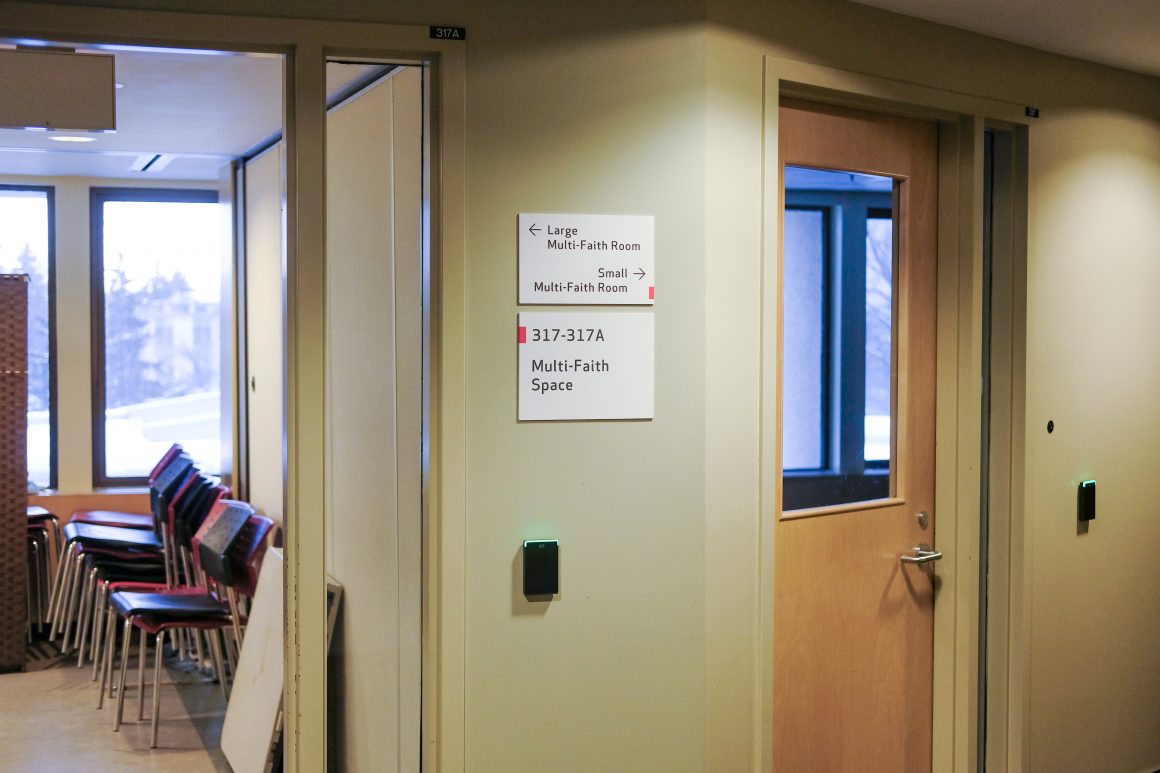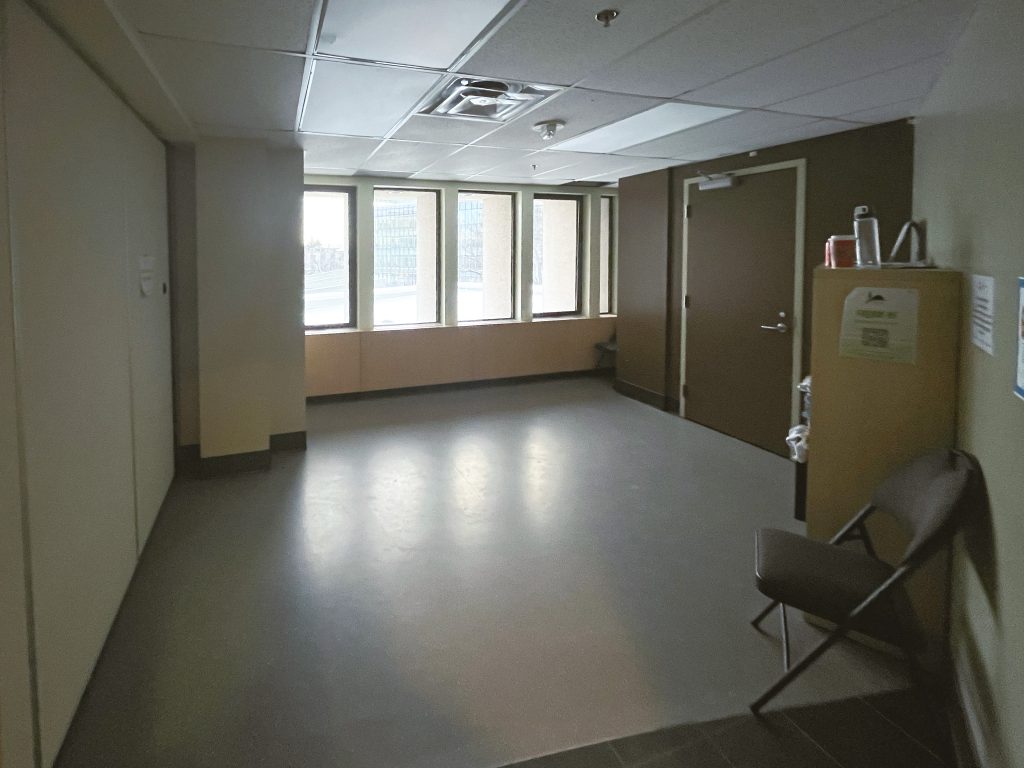
Are there enough multi-faith spaces for students at the U of C?
By Nazeefa Ahmed and Ramiro Bustamante Torres, January 30 2024—
The University of Calgary has a diverse range of students practicing faiths such as Christianity, Islam, Sikhism, Judaism and Buddhism. Many of these groups require adequate spaces to perform religious obligations, host events and connect with the community. Though the U of C does have spaces available, it appears that the demand is too high to adequately accommodate the student population.
According to the Faith & Spirituality Centre (FSC), there are five spaces set aside for religious purposes. One of the major spaces is the MacEwan Hall Multi-faith rooms (MH 317 and 317a) with a capacity of 50 people. The next major space is the Vitruvian Space (DC 12) found in the Dining Centre, with three rooms: Firmitas A with a capacity of 50 people, Firmitas B with a capacity of 173 people, Venustas room across the hallway with a capacity of 50 people. Two rooms are found in Scurfield Hall’s Business Library (Room 301c) with a capacity of 4 people and in Education Tower (ET 202c) with a capacity of 4 people. The last space is found on the Foothills Campus in the Health Science Centre (HSCB 1001) with a capacity of 10 people. Therefore, in total, all the spaces on Campus can accommodate 341 people at one time.
The Gauntlet reached out to an array of faith groups at the U of C to compile experiences of accessing the spaces and how it has affected their ability to perform religious obligations on campus.
The Muslim Students’ Association (MSA) stated that the spaces available at the university are not enough for the large population of Muslims who use the rooms multiple times a day.
“The MSA holds the viewpoint that the current provision of campus spaces for students is insufficient. Given our substantial Muslim student population of over 7,000, we currently rely primarily on two main locations, namely, those within Mac Hall and Vitruvian.”

Followers of Islam pray five times a day: before dawn, noon, mid-afternoon, after sunset and at night. Since prayers must be timely, there is a high demand for the rooms at certain times of the day, especially noon and mid-afternoon.
“However, these spaces are frequently booked for events and are situated in close proximity to the central campus area. This presents logistical challenges, particularly when students are located in distant parts of the university. We advocate for the establishment of adequately sized faith spaces in each academic building. Our primary recommendation is to prioritize the creation of such spaces within the Engineering (ENG), Information and Communications Technology (ICT), and Taylor Family Digital Library (TFDL) facilities,” the statement continued.
When the space is booked or full, however, students have resorted to praying outside the room. This has created a fire hazard, according to a sign placed by the FSC in front of the two rooms.
The university acknowledges the growing need for religious spaces on campus and commits to providing solutions.
“While the University of Calgary campus currently offers multi-faith prayer space in five locations, we acknowledge there is growing demand for additional locations convenient to everyone,” said the U of C in a statement to the Gauntlet. “We recognize that additional multi-faith space is a genuine need for students, staff and faculty in promoting personal well-being and making UCalgary a welcoming community for all. We are committed to finding both short and long-term solutions, and have reached out to students who expressed concerns over a need for additional space, to ensure their collaborative ideas are heard and discussed.“
Other than the MSA, the Sikh Students’ Association describes how they are grateful for the available spaces on campus, but while they have been able to accommodate their religious practices, there is an increase in students being involved.
“We appreciate everything the University of Calgary has done for us. The Multi-Faith Spiritual Centre has been more than kind to us and offered spaces for our weekly Simran (meditation). Going forward, it would be nice to see more spaces being built specifically for religious purposes only. With that being said the university is very diverse and has many people who confide to their religion, this uptakes the little amount of space that has been given to everyone. As there have been spaces for all kinds of ventures; sports, education, clubs, etc, even new places being built that do not suit what is needed by religious clubs. It would be nice to have one dedicated to the religious clubs/students of U of C.”
They also believe that additional spaces would be beneficial for their club.
“Furthermore, with our club starting to increase in numbers, it would be appreciated if we were able to have more spaces available for us to do our club events and weekly meditation; being able to utilize classrooms or event spaces that are not regularly used would be a perfect example of ways to benefit everyone,” the statement continued.
Daniel Mok, a campus minister for the Pentecostal Chaplaincy and alumnus, shared how there has been an increase in spaces on campus throughout the years, seeing more available spaces being formed.
“From my first year as a student, I remember that there were very few available spaces on campus for religious life. However, now we have a fully functional FSC, with the large and small Multi-Faith Spaces in MacHall, the Vitruvian Space with multiple rooms in the Dining Centre, and the Foothills Multi-Faith Room which can all be booked.”
The Hillel Calgary chapter and SSI were reached out to but they declined to comment.
Students’ Union (SU) vice-president student life Ermia Rezaei-Afsah shared his thoughts on the issue and his involvement in working with the university.
“I have been meeting with university administration regarding this issue, but the fact of the matter is that there is a lack of space on campus. There are a host of concerns that we are working with admin to address, and this is one of them. We are looking for unique, innovative situations but at this time there are no permanent quick fixes available. We have not had any direct complaints, but we have heard growing concern from students about the capacity of multi-faith spaces,” said Rezaei-Afsah.
While there are options for students on campus to pray or hold religious activities, there is a common issue that the campus community is growing and outgrowing these spaces. The university has shown commitment to expand on those options, but the efforts are being outpaced by the increasing demand. The issue is also the accessibility of these spaces, as the Vitruvian Space can accommodate more students but can be too far for some students in between classes. Some of the spaces can only accommodate up to four students, which cannot be enough for students.
Students seeking more information about faith spaces and programs can visit the FSC website.
